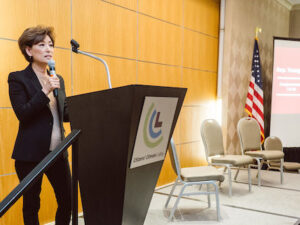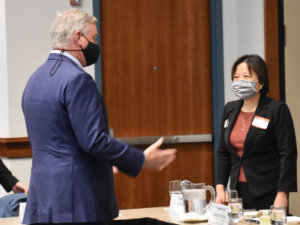
Sen. Mike Barrett and Rep. Jennifer Benson have each introduced carbon pricing bills into the Massachusetts legislature.
By Mary Gable
“This is really about a single idea: If you start posting a complete price for a product that is underpriced today, people will react to the complete price by using less. That’s it—carbon pricing in a nutshell. Massachusetts can lead the nation in the fight against climate change by applying this one concept to fossil fuels.”
Those are the words of Massachusetts State Senator Mike Barrett, who has been a fierce advocate of carbon pricing for years. It’s a simple solution, as he explained to the state legislature in 2015. In the two years since, local organizations that advocate for carbon fees have been busy with education, empowerment, and building of ground support for similar legislation.
This year, it might finally pay off, making Massachusetts the first U.S. state to put a price on carbon emissions.
Two bills, one solution
Not one, but two bills are being introduced in the Massachusetts legislature this session: one in the Senate, and one in the House. The Senate bill, sponsored by Sen. Barrett, is a revenue-neutral bill with similar features to Citizens’ Climate Lobby’s proposed Carbon Fee & Dividend.
The bill that will start in the House is sponsored by Representative Jennifer Benson and is “revenue-positive.” Eighty percent of revenues would be returned via rebates to households and employers, with the remaining 20 percent used to fund green infrastructure investments in transportation, clean energy, and protection against the impacts of climate change.
Rep. Benson’s bill uses a progressive formula to allocate a greater share of dividends to low- and moderate-income households. The two bills also differ in the starting price per ton on CO2 equivalent.
Two similar bills with different specifics—“This is very much intentional,” explains Michael Green, Executive Director of Climate XChange, a recognized leader in carbon pricing research. “This strategy allows legislators to compare different approaches to implementing a carbon price.”
The proposal that ultimately gets signed into law might be neither bill on its own, but rather a hybrid of the two. “Schoolhouse Rock! lied to us, in a sense,” Green says. “The process isn’t as simple as a bill passing through two houses of a legislature and being signed into law. Our legislators may review both the Senate and House bills, take the best aspects of each, and come up with a combination that makes the most sense for their districts.”
Climate XChange will be satisfied with any version of a carbon fee the legislature can agree on. When a vote on the matter might happen is less clear. The two bills gathered co-sponsors until last week’s deadline, February 3. Next, Climate XChange will meet with legislators who did not co-sponsor the bill to answer questions and address concerns, sharing in-depth analysis on the bills’ environmental and economic impacts.
A CCL member in the House

Rep. Goldstein-Rose, pictured here with legislative aide Catie Rutley, was sworn in last month.
Momentum for the bills is strong: more than a fifth of the legislature has already expressed support for a carbon fee. Among them is Solomon Goldstein-Rose, a first-term representative and a champion of carbon pricing.
Goldstein-Rose became interested in carbon pricing as a student at Brown University. He is a volunteer for CCL and founded the Energize Rhode Island Coalition, a statewide carbon pricing campaign. He plans to make his ideas about climate solutions heard. “Issues like carbon pricing should be bipartisan and non-controversial,” Goldstein-Rose says. “One of the reasons I ran for office was to get bold legislation like this on the table.”
Goldstein-Rose is optimistic that he and his colleagues will find a path forward, possibly establishing a carbon price as part of an omnibus energy package. He believes that the economic case for a carbon price will be a persuasive selling point. “The biggest takeaway is job creation,” he says. Massachusetts already leads the nation in energy efficiency and the size of its clean tech economy. A carbon fee would further invigorate this sector while helping the state achieve its emissions mandates.
A collaborative approach
If a measure succeeds, other states considering carbon pricing will look to Massachusetts’ example. What lessons can they learn? “This work takes everyone,” says Green. “The Massachusetts Campaign for a Clean Energy Future, of which Climate XChange is a part, began more than five years ago with just a handful of dedicated volunteers. We worked to build as diverse a stakeholder group as possible, including members of community, labor, and justice organizations. Creating an inclusive conversation made more people want to get involved.”
“Looking at the divisiveness we’re seeing nationally, it’s critical for policymakers to put their differences aside and find ways to work together,” Green adds. And together, we’re moving ever closer to the effective, just climate solutions we need.





